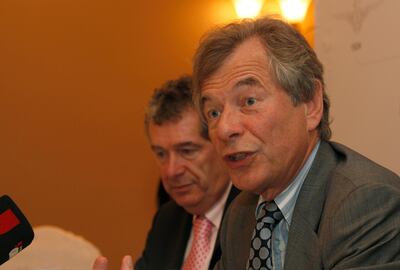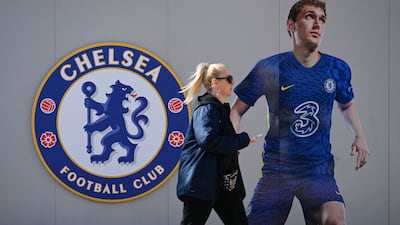Perhaps it’s because I’ve been watching the 50th anniversary screenings of The Godfather and The Godfather II that I can’t get the character Tom out of my head. He’s the consigliere, the fixer for the Corleone crime family.
Sir Martin Broughton is a consigliere. Not in the illegal, murderous Mafia sense, of course. Broughton, though, would fit perfectly into the role of consummate organiser, the one who pulls people together, who makes sure the wheels are turning in the right direction.
He did it at troubled tobacco giant BAT, again at British Airways, at the CBI, the British Horseracing Board, briefly at Liverpool Football Club and now he’s doing it again with a bid for Chelsea. On every occasion, he’s been the chairman or frontperson, speaking for others, in some cases looking after their money.
Remarkable, really. Nobody plays the system, knows how to smooth the path through the City, Westminster, Whitehall and the rest of the British Establishment better than Martin. I first met him at BAT, where he was finance director before becoming chief executive then chairman. At BA, I recall sitting in his office at the airline’s sparkling, modern Heathrow headquarters and marvelling at the fact his room was decorated with old horse-racing artefacts. It was an indication of his other job, heading the sport’s powerful regulatory authority.
What there wasn’t was any sign of his affection for Chelsea. Horses and chairing a major company like BA seemed to go hand-in-hand, both pukka and top tier. Football would have supplied a jarring note. At least if there was some soccer memorabilia, I don’t remember noticing it.
To be fair to Broughton, his love for the Blues came up in conversation. He grew up near their Stamford Bridge ground; they were his team, he had tickets for the Matthew Harding Stand, although he got to sit now and again with the directors.

The reason I mention this is that, try as I might, I cannot see Broughton as the owner of Chelsea. That, there, is the problem: if his attempt to buy the club succeeds he won’t be the owner, he will be representing the owner or owners. His is a consortium effort and strangely, Broughton won’t identify publicly the money men putting up the estimated £2bn-plus thought to be required to secure the current world and European champions. That may be because they hold stakes in rival Premier League clubs, possibly Crystal Palace, and those holdings would have to be disposed to purchase Chelsea. But that rather makes the point: Broughton will have to answer to others.
Broughton matters, since right now he appears to be the front-runner. There are several bidders, but Martin, who is a brilliant charmer and networker, seems to be in the lead. To add extra polish he’s drafted in Sebastian, now Lord, Coe, chief of World Athletics and the London 2012 Olympic Games, and fellow lifelong Chelsea fan, to work alongside him. Given their CVs (after he quit being a stellar athlete, Coe went into politics, serving as a Conservative MP and the party leader’s chief of staff) it’s not surprising that in government circles they’re spoken of as the most preferred.
That’s important, too, because since the imposition of sanctions that forced Russian oligarch Roman Abramovich to sell, the government has final approval over the buyer.
Between them, Broughton and Coe know which buttons to press – media and government-wise. Private polling has been made available to the press showing that 67 per cent of Chelsea supporters welcome the Broughton approach. Apparently they like that he’s a “true Blue”, as is Coe, and they admire how he found new owners for Liverpool in the US, in Fenway Sports Group.
This, though, is the weakness in their bid, indeed in all the bids. In the end, despite Broughton’s impeccable credentials, it’s not his cash. The same is true of the rest of the parties believed to be interested. No single person or entity is either prepared, or has deep enough pockets, to buy Chelsea outright.
Nick Candy, the property developer, is another would-be owner who is brilliant at PR. But Candy, for his talk, is also acting for not one, but a group of investors. It’s the case with all the bidders – they’re groups. What there is not is a single purchaser, another Abramovich.
It can’t be coincidence that Abramovich ploughed a fortune into Chelsea without seeing any financial return. He departs, having made a huge loss. Yet he also leaves with Chelsea as world and European number one.
There's a different driver in the affairs of Liverpool, Manchester United and Arsenal. They’ve got bosses who are looking to them to make a profit. Unlike Chelsea and Manchester City, they were instrumental in putting together the disastrous European Super League. Chelsea and Manchester City loaned their support but only begrudgingly – they were deliberately late to the party and quick to exit.
Would Chelsea have achieved the same success if they’d belonged to Broughton's collection of interested investors? It’s hard to imagine – given that Chelsea was a lesser club in terms of the size of its crowds, history and global reach, and the constraints around redeveloping its stadium.
Abramovich was a remarkable example in the annals of proprietors in the modern game: generous, mercurial, passionate. He did not own Chelsea to make money. None of the bidders share his beneficence. That’s the realisation the club’s supporters face, that they reached the pinnacle because of the obsession, some might call it the craze, of one man. It’s difficult to see that being sustained, no matter how well-connected and urbane the new chairman may be.


